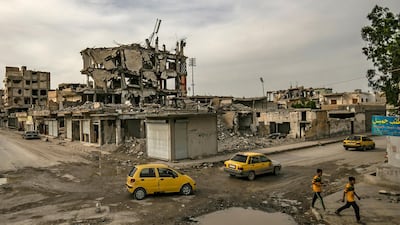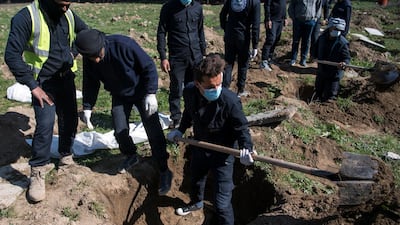The cruelty of the ISIS terror group is well-documented. Mass murder, ethnic cleansing, the enslavement of the Yazidis, the recruitment and indoctrination of child soldiers, the forced displacement of Christians, the execution of journalists and aid workers and the destruction of cultural heritage are merely some of the war crimes and crimes against humanity that the group committed during its brutal reign.
The purging of the group in 2017 from its main strongholds in Raqqa and Mosul and its subsequent military defeat put an end to this brutality. But three years after the fall of its self-proclaimed capital in Syria, mass graves of its victims are still being found, and many thousands remain unaccounted for. Their families still suffer.
In September, a collective of first responders operating under the aegis of local authorities in Raqqa, Hasakah and Deir Ezzor, three of the provinces that suffered the most under ISIS, said it had uncovered five mass graves in northeast Syria in 2020 alone, including three at the location of former ISIS prisons and detention centres. In total, 28 mass graves have been uncovered by the teams since the terror group's defeat – containing 4,072 bodies. Most of them have not been identified.
Back in early 2018, I reported on an online group that was founded by a Syrian man from Raqqa whose brother was made to disappear by ISIS in 2013. Called “Where are the Kidnapped by ISIS?”, the page continues to post images sent by families and loved ones of their disappeared relatives, hoping one day for answers.
Those answers may be a long time coming because the lives of ordinary Syrians were always secondary to the aims of the combatants in the country. The global coalition’s campaign against ISIS was meant to safeguard against the group’s ability to strike and carry out spectacular terror attacks abroad, not its abuses against Syrian civilians, who were killed in the hundreds of thousands during the civil war, most of them at the hands of the Syrian government.
The lack of closure regarding the fate of those civilians who were held in ISIS makeshift prisons continue to torment their loved ones.
Then there is the question of justice – if and when the bodies are ever identified. Who will be held to account for these widespread abuses?
It is telling that few ISIS operatives have faced anything besides direct mortal retribution for the crimes they visited, such as the many who were sentenced to death in Iraqi courts or killed in American airstrikes.
Those who are facing trial do so because they committed crimes against westerners.
Last month, a British court cleared the way for evidence to be transferred to the US Justice Department in the case of the ISIS "Beatles," two executioners who orchestrated the videotaped killings of journalists and aid workers like James Foley. This will allow their trial to proceed in the US.
This should be the norm, rather than the exception. ISIS operatives captured by Kurdish and American forces, and those repatriated to their home countries in the Middle East and the West, should be tried for the crimes they committed. Such trials should take place under the aegis of an organisation such as the International Criminal Court since the criminals span such a broad range of nationalities and ethnicities, and to build a fuller picture of the systematic crimes carried out by the group.
It will be a long and difficult journey for the families of ISIS victims. They may never find out the fates of their loved ones. Seeing their killers held to account may bring some answers – or at least a measure of succour.
Kareem Shaheen is a veteran Middle East correspondent in Canada and columnist for The National





